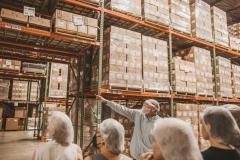 In 1986, equal exchange was founded by Rink Dickinson, Michael Rozyne and Jonathan Rosenthal as a worker-owned fair-trade cooperative. They aimed to address the growing disconnection between consumers and the sources of their food. The radical idea was to create an alternative Trade Organization, promoting fair prices for farmers, supporting small farmer cooperatives, and ensuring ethical international trade. Over the years, consolidation in the food industry, driven by corporate monopolies, limits choices for farmers, businesses, and consumers. This concentration leads to exploitative practices, reduces options for communities, and contributes to food deserts and ecological damage. Experts argue against the for-profit, efficiency-based system, advocating for a diverse approach involving small and large entities, cooperatives, and fair trade. Despite challenges, efforts persist to reclaim control from corporate greed and create a healthier, fairer, and transparent food system through community-based initiatives.
In 1986, equal exchange was founded by Rink Dickinson, Michael Rozyne and Jonathan Rosenthal as a worker-owned fair-trade cooperative. They aimed to address the growing disconnection between consumers and the sources of their food. The radical idea was to create an alternative Trade Organization, promoting fair prices for farmers, supporting small farmer cooperatives, and ensuring ethical international trade. Over the years, consolidation in the food industry, driven by corporate monopolies, limits choices for farmers, businesses, and consumers. This concentration leads to exploitative practices, reduces options for communities, and contributes to food deserts and ecological damage. Experts argue against the for-profit, efficiency-based system, advocating for a diverse approach involving small and large entities, cooperatives, and fair trade. Despite challenges, efforts persist to reclaim control from corporate greed and create a healthier, fairer, and transparent food system through community-based initiatives.
- Home
- About Us
- Issues
- Countries
- Rapid Response Network
- Young Adults
- Get Involved
- Calendar
- Donate
- Blog

